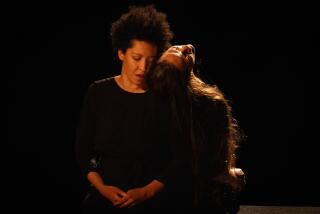O.C. POP MUSIC REVIEW : Bolton’s Sob Stories
COSTA MESA — Michael Bolton wanted to know: “What are the relationships like around here?”
A pretty broad question when you’re asking 15,000 or so people, as Bolton did Saturday night at the Pacific Amphitheatre. Nevertheless, he asked as if a simple, one- or two-sentence answer could cover everybody.
That absurd generality reflected the thinking behind his dismayingly generic love songs. Never mind the ambiguities and individual twists that make up romantic behavior, the particulars that, when vividly rendered in a song, can say something universal.
The method of Bolton and his collaborators (his most frequent one is Diane Warren, the highest priestess of the lowest-common denominator) is to encapsulate a feeling in plain wrapping and put it out for mass retail.
You don’t find characters in Bolton’s songs, other than a faceless “I” and “you.” His lovers exist in a vacuum. There is no intrusive or enticing world outside their one-on-one cocoon, no sense of a history that has brought them to a critical moment, no description, no etched memories, no illuminating incident. There is none of the flesh of life.
Instead, there is just a basic feeling, along the lines of “I need you,” or “I’m hurt,” or “I’ll love you forever.” Take that feeling, couch it in blandly declarative phrases that shun imagery and the artful play of words as if imagination were a crime and cliche a commandment, and you have the basic product: pablum.
Coat it with lots of sugar (can’t accuse Bolton and his pards of not being able to write an insinuating chorus melody), box it along with tinkly-chime synthesizers and swoop-and-grind guitars, and you’re ready to sell (and sell, and sell, and sell: Bolton’s 1989 album, “Soul Provider,” has sold more than 4 million copies and is still on the charts; the current “Time, Love & Tenderness” has “moved product” to the tune of more than 2 million).
Now, who better to put on the big, big sell for such an impoverished product than a guy with a big, big voice?
Bolton’s singing was impressive at the Pacific, with his wide-range, raspy, R&B-tinged; textures, and titanic force. This, his admirers might say, is a guy who really emotes, who lets it all out on every song, never holding back.
Yes, Bolton may be the Charles Atlas of singers. But as this softball enthusiast must know (Bolton bragged about his team’s perfect record, and introduced each band member by the position he plays), you can’t swing freely if you’re muscle-bound. And you can’t capture an ebb and flow of feelings if you’re always trying to belt a tune out of the park.
Bolton’s mauling of “Georgia on My Mind” illustrated the wrongheadedness of going for the big gesture at every turn. This is a song of reverie, of intimacy--a song on which Ray Charles whispers and quietly keens far more than he erupts.
Bolton, in a ludicrous staging gimmick, sang it at maximum force from the middle of the amphitheater, surrounded by the crowd and a cordon of security guards whose dark suits made them look like the Secret Service. So much for reverie and intimacy. Bolton’s inflated version of Otis Redding’s (“Sittin’ on) the Dock of the Bay” also sacrificed content to style.
At least Bolton batted one for three on soul classics. He finished strongly with Percy Sledge’s “When a Man Loves a Woman,” a song that welcomes all the ardor and lung power a singer can bring to bear. The show’s other likable tune was the funky “Love Is a Wonderful Thing”--the only number in the 1-hour, 45-minute performance that turned the mood light and breezy.
The rest was sobbing, heaving, embattled stuff, as Bolton alternated between groaning ballads and stormy pop-metal-lite, including numbers like “How Can We Be Lovers” and “I Found Someone,” the hit he wrote for Cher.
Bolton clearly realized that, given that somber repertoire, his show required some leavening. That led to an ill-advised unleashing of his band for a slick, shapeless funk-rock-fusion jam, and to his decision to sally into the audience during “Georgia on My Mind.”
A low-key host whose plain bearing gave no hint of his ostentatious singing approach, Bolton tossed out a few quips between songs (what he got back from many of his female fans was roses--almost enough to build a New Year’s float). Bolton also poked fun at his vocal style by briefly launching an operatic aria.
Bolton’s big story of the night concerned how Bob Dylan summoned him to collaborate on a song--”Steel Bars,” which appears on Bolton’s latest album and probably has netted Dylan a nice piece of change. Bolton spoke of younger days when he would pore over Dylan’s albums, trying with difficulty to figure out what the songs meant. On the evidence of his own output, that brain-taxing experience must have scared Bolton off the hard stuff for life.
Oleta Adams’ opening set offered some of the nuance and depth that Bolton’s lacked. Recalling Anita Baker with her deep, rich voice and soul and jazz influences, the piano-playing newcomer from Kansas City combined idealism and sass during her 45-minute performance. “I’ve Got to Sing My Song” gave gospel-inflected expression to Adams’ belief in music as a calling. The ballad, “Get Here,” was a fine romantic reverie. And if the closing tune, “Spirit,” was too close to cheerleading, it allowed Adams to show off some stylish dance moves.
More to Read
The biggest entertainment stories
Get our big stories about Hollywood, film, television, music, arts, culture and more right in your inbox as soon as they publish.
You may occasionally receive promotional content from the Los Angeles Times.











